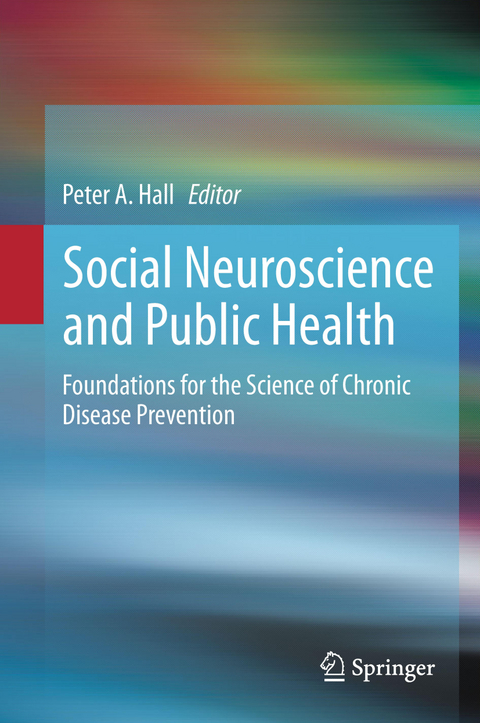
Social Neuroscience and Public Health
Springer-Verlag New York Inc.
978-1-4899-9131-7 (ISBN)
Peter Hall, PhD, CPsych, is an associate professor of applied health sciences at the University of Waterloo (UW), where he is jointly appointed to the School of Public Health and Health Systems and to the Department of Kinesiology (Neuroscience research group). Dr. Hall is a past recipient of the Canadian Institutes for Health Research (CIHR) New Investigator Award, and an Early Career Award from the Canadian Psychological Association (Health Psychology section). He is founding director of the UW Social Neuroscience and Health Laboratory. His research examines the joint contributions of social-cognitive and neurocognitive factors to the production of health behavior trajectories in everyday life. Dr. Hall serves on the editorial boards of Health Psychology and Journal of Behavioral Medicine, and he is associate editor for the Encyclopedia of Behavioral Medicine, as well as the forthcoming Springer volume, Behavioral and Social Science in Medicine. He is a licensed clinical psychologist andhas more than a decade of experience providing clinical services to chronic illness populations in multidisciplinary healthcare settings.
I. Theoretical Perspectives.- Preface.- Chapter 1: Picoeconomics in Neural and Evolutionary Contexts.- Chapter 2: Neurophysiological Correlates of the Self-Regulation of Goal Pursuit.- Chapter 3: Temporal self-regulation theory: Integrating biological, psychological and ecological determinants of health behavior performance.- II. Health Communication.- Chapter 4: Health Communications: Predicting Behavior Change From the Brain.- Chapter 5: Neurobiological bases of self-reference and deliberate processing in tailored health communication.- III. Health behaviors.- Chapter 6: Neurocognition and Medication Adherence in HIV Infected Adults.- Chapter 7: Alcohol Consumption and Self-Regulation.- Chapter 8: The Strength Model of Self-Control: Recent Advances and Implications for Public Health.- Chapter 9: Incentive-Based Interventions: Historical Context and New Directions.- IV. Social Connections, Socioeconomic status and Stress.- Chapter 10: Social Relationships and Public Health.- Chapter 11: Brain functions modulating redistribution of natural killer cells accompanying cognitive appraisal of acute stress.- Chapter 12: Alzheimer's Dementia and Lifestyle – Towards a Primary Prevention.- Chapter 13: Social determinants of self-regulation development.- V. Exercise Neuroscience.- Chapter 14: Physical Activity, Cardiorespiratory Fitness and Cognition across the Lifespan.- Chapter 15: Brain glycogen decrease and supercompensation with prolonged exhaustive exercise.- Chapter 16: Resistance Training and Cognitive and Cortical Plasticity in Older Adults.- VI. Methods Primer.- Chapter 17: Brain Imaging: A primer.- Chapter 18: Survival analysis in social neuroscience and public health: A research exemplar from the field of cognitive epidemiology .- Chapter 19: Neurobiological facets of food craving and consumption: Evidence from Neuropsychological and Transcranial Magnetic Stimulation (TMS) Studies.-
| Zusatzinfo | 4 Tables, black and white; XVI, 318 p. |
|---|---|
| Verlagsort | New York |
| Sprache | englisch |
| Maße | 155 x 235 mm |
| Gewicht | 5095 g |
| Themenwelt | Geisteswissenschaften ► Psychologie ► Biopsychologie / Neurowissenschaften |
| Geisteswissenschaften ► Psychologie ► Sozialpsychologie | |
| Studium ► Querschnittsbereiche ► Prävention / Gesundheitsförderung | |
| Naturwissenschaften ► Biologie ► Humanbiologie | |
| Naturwissenschaften ► Biologie ► Zoologie | |
| Sozialwissenschaften ► Soziologie | |
| Schlagworte | Attentional processes • Brain-behavior relationship • Cognitive epidemiology • Contingency management • Executive function and health behavior • Health Communication • Health decision making • Health media • Health Outcomes • Neurobiology of self-regulation • Neuroeconomics • Neuroscience methods • Population neuroscience • Social neuroscience |
| ISBN-10 | 1-4899-9131-X / 148999131X |
| ISBN-13 | 978-1-4899-9131-7 / 9781489991317 |
| Zustand | Neuware |
| Haben Sie eine Frage zum Produkt? |
aus dem Bereich


